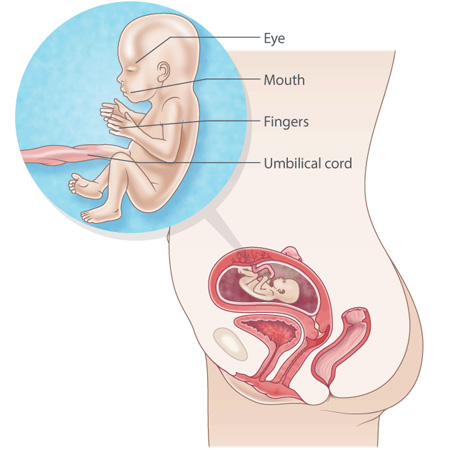You at 17 weeks pregnant
You might have more vaginal discharge, so sanitary pads or panty liners could come in handy. If the discharge changes colour, smells bad, or smells stronger or more ‘fishy’ than usual, see your doctor or midwife.
You might have a lot of energy. People are probably starting to notice that you’re pregnant. It might be time to shop for pregnancy bras and maternity or comfortable clothes.
Healthy weight gain in pregnancy
Healthy weight gain, healthy eating and regular physical activity during pregnancy can keep you and your baby healthy.
If you’re at a healthy weight, it’s recommended that you gain 11.5-16 kg throughout pregnancy.
If you’re overweight or obese, it’s recommended that you gain 11.5 kg or less, depending on your starting weight. This will still allow your baby to grow healthily, but limit extra weight gain for you.
It’s important to talk with your doctor or midwife about the best amount of weight gain for you during pregnancy. Your health professional might check your weight at pregnancy appointments.
Your health professional will recommend that you have an ultrasound scan at 18-20 weeks. Your baby will look like a real baby on this scan – it’s usually very exciting. But the 20-week ultrasound is also a screening procedure that checks your baby’s development and body parts, as well as the position of the placenta. Think about how you might feel and what you’d do if you’re told that your baby has a high chance of complications or an anomaly.
Antenatal classes
Antenatal classes offer detailed information to help you and your birth partner get ready for the later stages of pregnancy, labour, birth, breastfeeding and early parenting.
Even if you’ve done a lot of research online or talked to others, at antenatal classes you can talk to an expert (usually a midwife) about your questions and concerns. Antenatal classes are also a great chance to meet other expectant parents.
You can usually do antenatal classes over several weeks on weeknights, or you might have the option of doing a weekend class. Classes can fill up quickly, so ask your doctor or midwife about making a booking in early pregnancy.
Classes will often include a tour of the maternity unit. There might be a fee.
Many hospitals offer specific classes, like active birth, hypnobirth or calm birth. You can also do classes in a community setting or at home. If you’re interested, ask your doctor or midwife for more information.
Your baby when you’re 17 weeks pregnant
Your baby is getting bigger all the time and might now weigh more than the placenta:
- Your baby is about 13 cm from head to bottom and about 150 g.
- Your baby’s external sex organs are completely formed.
- The kidneys are working, and your baby passes urine every 50 minutes or so. Your baby will also swallow some urine (which is sterile) in the amniotic fluid. This is normal.
- Loud noises might make your baby startle.
- Your baby’s taste buds are working, and your baby can tell the difference between sweet and bitter.